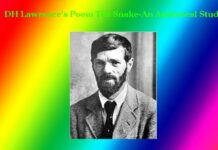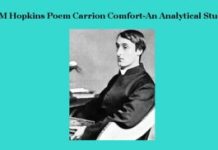Note of Optimism in Walt Whitman’s Poetry
Note of Optimism in Walt Whitman’s Poetry
Note of Optimism in Walt Whitman’s Poetry
‘Optimism’ is a doctrine or ‘ism’ that looks at only the bright side of life ignoring all the gloomy sides and holds the view that ultimate good or happiness comes to life. Walt Whitman, the national poet of America, was an optimist. In many of his poems, his optimistic outlook toward life is expressed without any veil. He was optimistic about every aspect of life including death also. A general analysis of his poetry shows him to be so.
In section -50 of ‘Song of Myself’, he admits that the world is full of happiness—but one must know to enjoy it. He says addressing his brothers and sisters:
”It is not chaos or death—it is form union,
Plan—it is eternal life—it is Happiness.”
The poet welcomes everything that happens naturally to him. He even welcomes, like a hero, old age which is generally full of pessimism—sorrow, sufferance and negligence. He writes:
”Old age superbly rising! O welcome, ineffable grace
of dying days!
Every condition promulgates not only itself,
it promulgates what grows after and out of itself.”
Instinctively every man is afraid of death. But Walt Whitman is defiant to death. He bears a bright outlook on death and says that to die is as lucky as to be born:
”Has anyone supposed it lucky to be born?
I hasten to inform him or her, it is just as lucky to die….”
Again in the same poem, ‘Song of Myself’, he challenges death and writes:
”And as to you Death and you bitter hug of mortality
it is idle to try to alarm me.”
The poet is hopeful to sensual life also. He wishes to enjoy life to the full with natural freedom and says:
”Today, I go consort with nature’s darlings—to night too
I am for those who believe in loose Delight—
I share to the mid-night orgies of young men.”
The poet glorifies worldly life. In him, there is not the slightest gloomy outlook toward earthly life. So, he celebrates the human body as—
”If anything is sacred, the human body is sacred.”
Again in the same poem, he welcomes every attribute of life and says:
”Welcome every organ and attribute of me,
And of any man hearty and clean.
Not an inch nor a particle of an inch is vile.”
The poet rightly advocates that ‘love’ is the main source of all happiness and it is love that can solve every problem:
”Be not disheartened—Affection shall solve
the problems of freedom yet:
Those who love each other shall become invincible.”
‘Song of the Open Road’ is a poem that is full of the cheerfulness of life. He hopes that advancement in life must come. It will come to everybody. He says:
”Henceforth I ask not good fortune,
I myself am good-fortune,
Henceforth I whimper no more, postpone no more,
need nothing,
Done with indoor complaints, libraries querulous criticisms
Strong and content I travel the open road.”
The poet closes the poem with a note of faith and hope, as—
”Will you give me yourself? Will you come travel with me?
Shall we stick by each other as long as we live.”
The above analyses show us that there is a considerable note of optimism in Walt Whitman’s poetry. But his optimism is pertaining to natural freedom. He hopes to enjoy life cheerfully not within a social institution or through convention but wildly and vehemently through wayward living. But his place as an optimistic poet in American literature is perhaps after none. 0 0 0
Note of Optimism in Walt Whitman’s Poetry
Note of Optimism in Walt Whitman’s Poetry
N.B. The article ‘Note of Optimism in Walt Whitman’s Poetry’ originally belongs to the book ‘Walt Whitman’s Poetry A Thematic Study‘ by Menonim Mennimus.











